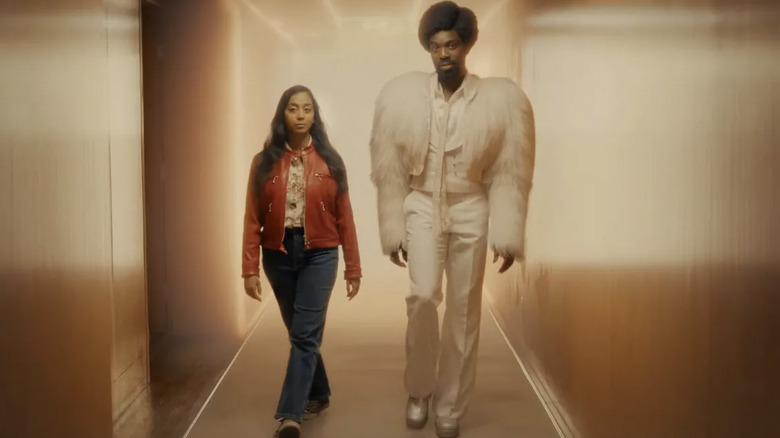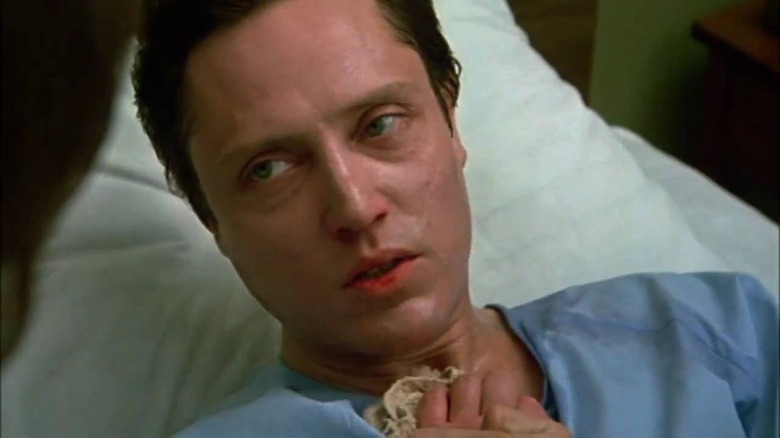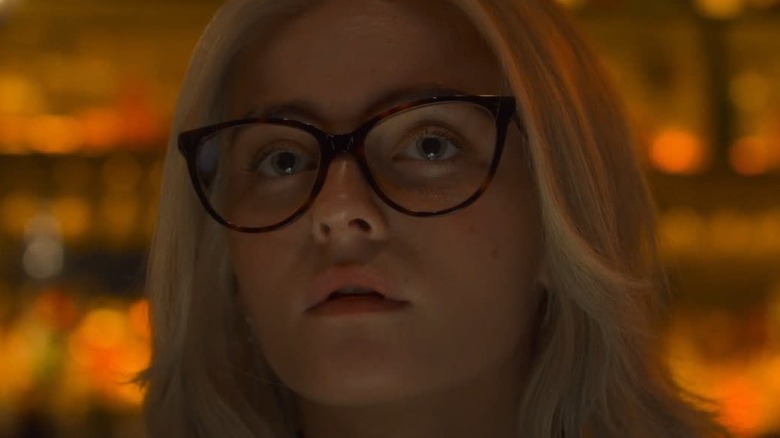Doctor Who Puts Its Own Spin On A Stephen King Horror Classic
"73 Yards" is the strongest episode of the new "Doctor Who" season so far, which is surprising considering it's the first one that barely features the Doctor at all. Showrunner and episode-writer Russell T Davies has taken a cue from season 4's Doctor-lite episode "Turn Left," taking us through years of the companion's life without the Doctor around to help her out. The results are terrifying: as soon as the Doctor's gone, Ruby finds herself followed by a mysterious old woman. The woman magically stays exactly 73 yards away from Ruby at all times, and whenever Ruby sends someone else to talk with her, they freak out and suddenly want nothing to do with her.
It's a mysterious premise that puts Ruby through the wringer like we've never seen before. First, she has to spend a few nights alone at an inn filled with the world's rudest patrons. Then she goes home and ends up abandoned by her foster mother Carla. "Not even your birth mother wanted you," a vindictive, seemingly possessed Carla tells Ruby after kicking her out of their home. It's around this point we'd expect the Doctor to pop back in and fix things, but no: Ruby's left to deal with those harsh words for the rest of her life. Even a returning Kate Lethbridge-Stewart, who stops by to shine some light on the season's ongoing arc of magic-related problems rather than science ones, is no help.
Ruby spends decades going through life with nobody to help her. It's only in the second half of the episode that she thinks she's figured out what this is all about: she has to take down rising politician Roger AP Gwilliam, whom the Doctor mentioned earlier was going to lead the world into a nuclear war. Does this sound familiar?
Didn't Black Mirror do this already?
Spoilers for "Black Mirror" season 6 below.
For modern audiences, the storyline is strikingly reminiscent of the latest season of "Black Mirror," which features an episode ("Demon 79") where the main character has to kill a candidate for prime minister before he leads the country into a far-right, xenophobic, war-happy realignment. Why is it that British sci-fi writers are suddenly really interested in stories where they get to kill the prime minister? I'm sure it's just a coincidence.
Of the two recent shows, the "Black Mirror" approach is far more cynical. The episode takes place in the late '70s, and the evil politician's plans for the UK aren't that different from what's actually ended up happening in the 40+ years since. Similar to Reagan's reign in America, Thatcherism in the '80s led to a major rightward realignment in the UK's political landscape. Although the Labour party would eventually return to power, it did so by moving more to the center, and was followed by an ongoing 14-year Tory reign — one that the "Black Mirror" writers don't seem happy about. "Demon 79" ends with the world literally exploding in a nuclear Armageddon, with the implicit message being that maybe this short and quick death is better than what Britain's currently going through.
"Doctor Who" took the more optimistic approach. Future PM Gwilliam is written in a relatively apolitical way — he's bad because he's got a nuke fetish, that's all — and he's defeated not through murder but through Ruby cleverly placing the mysterious old lady demon right next to him. It's a family-friendly version of the same basic story arc, giving us perhaps the first version of this story where the hero doesn't perish in their attempts to save the world.
Both episodes' main inspiration? The Dead Zone
You can't accuse "Doctor Who" of ripping off "Black Mirror" here, because if anything "Black Mirror" was ripping off Stephen King, who published "The Dead Zone" in 1979. The famous novel centered on a guy who gets psychic powers, and then has a vision of a politician gaining the presidency and nuking the world. It's a pretty golden "what if?" premise, so we can forgive later shows and movies from revisiting it. (Although to be clear, nobody ripped off anyone here; people have been thinking up excuses for assassinating politicians long before King wrote a book about it.)
I've written before how "Demon 79" made for a fun retrospective on King's original story, because it's approaching the same time period but with the benefit of hindsight infused into it. Although King's evil politician character Greg Stillson reads like a Trump parallel these days (as King himself is happy to point out), there's no strong sense in the book itself that he's aware of the conservative shift in America that's coming. Sure, the depiction of the main character's mom falling prey to religious grifters still feels incredibly timely in a world of QAnon. But by and large "The Dead Zone" is an optimistic novel, one where the day is saved because Americans are exposed to the truth of Greg Stillson and choose to reject him.
"Demon 79" has no such faith in the media or the British people, nor does it need a nuclear Armageddon to motivate its protagonist. She's motivated simply by the desire to avert the world we're mostly already living in, even down to those pesky robot dogs.
Doctor Who offers a happier ending
Spoilers for "73 Yards" below.
"Doctor Who" hits more of the same notes as King's original story, even down to the part where the evil politician storyline doesn't even rear its head until halfway through. Just as Johnny in "The Dead Zone" spends the first half of the novel recovering from his coma and solving a few mysteries, Ruby spends nearly twenty years coasting through a solitary life, going through one unsatisfying relationship after another one. Both protagonists feel a strong sense of "Why me?" before the introduction of the evil politician brings some purpose back into their life.
Ruby's far more successful with her quest to take down Gwilliam, which really goes to show just how cool she is, even when the Doctor's not around. Of all the versions of "The Dead Zone" we've gotten over the years (even the "Simpsons'" take on it), the main character has always died in their pursuit of stopping the apocalypse, but Ruby does it without even going to jail. She casually saves democracy as part of a side quest, then goes back to wondering why that old woman's still following her. If only Ned Flanders could've handled the situation with Ruby's grace.
Why Doctor Who's '73 Yards' works so well
"73 Yards" is such a strong episode because it finally gives Ruby her time to prove what she's made of. Although Ruby's been a fun, charming presence so far, throughout the first few episodes of the season she hasn't done much to distinguish herself from previous companions. This is the first episode where we've gotten to see Ruby go up alone against a villain in her own Ruby way.
She's not that great at it — the Doctor probably could've solved this whole thing within 50 minutes or so, not 50 years — but she handles it with a level of kindness and persistence that's certainly admirable. There's the strong implication that Ruby could kill the spirit woman by getting on a plane or a boat, but she doesn't do this because she doesn't want the spirit to die, regardless of how much she's ruining her life. This kindness turns out to be vital, as the spirit woman is revealed to be Ruby as an old woman, trapped in a constant loop of trying to warn her younger self about the magic circle the Doctor's about to step in.
Thank god Ruby didn't kill her, because then we wouldn't have gotten the quasi-bootstrap paradox that'll let us enjoy the rest of this fun season of Ruby and Doctor adventures. Some fans might be disappointed that Ruby doesn't remember anything from the experience, that she doesn't meaningfully change as a result of anything she's just been through, but ultimately "73 Yards" was a story for us, not her. This was when we finally got to feel as close to Ruby as we did to companions like Rose, Martha, Donna. After several episodes of holding her at arm's length, "Doctor Who" has finally given Ruby her space to shine.




